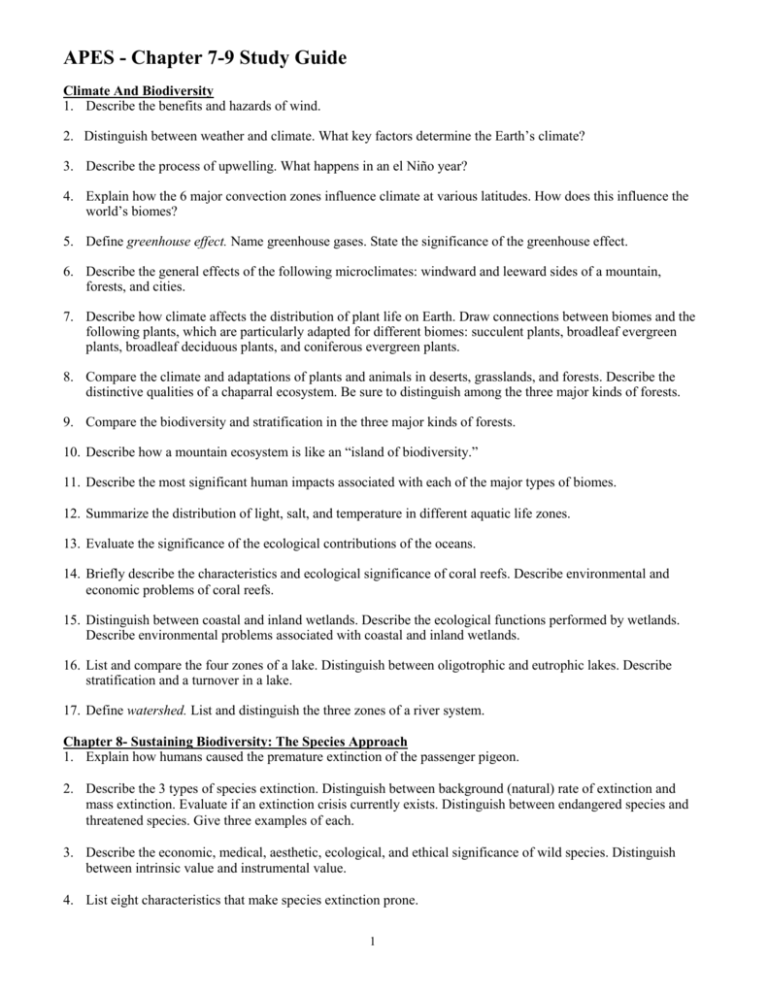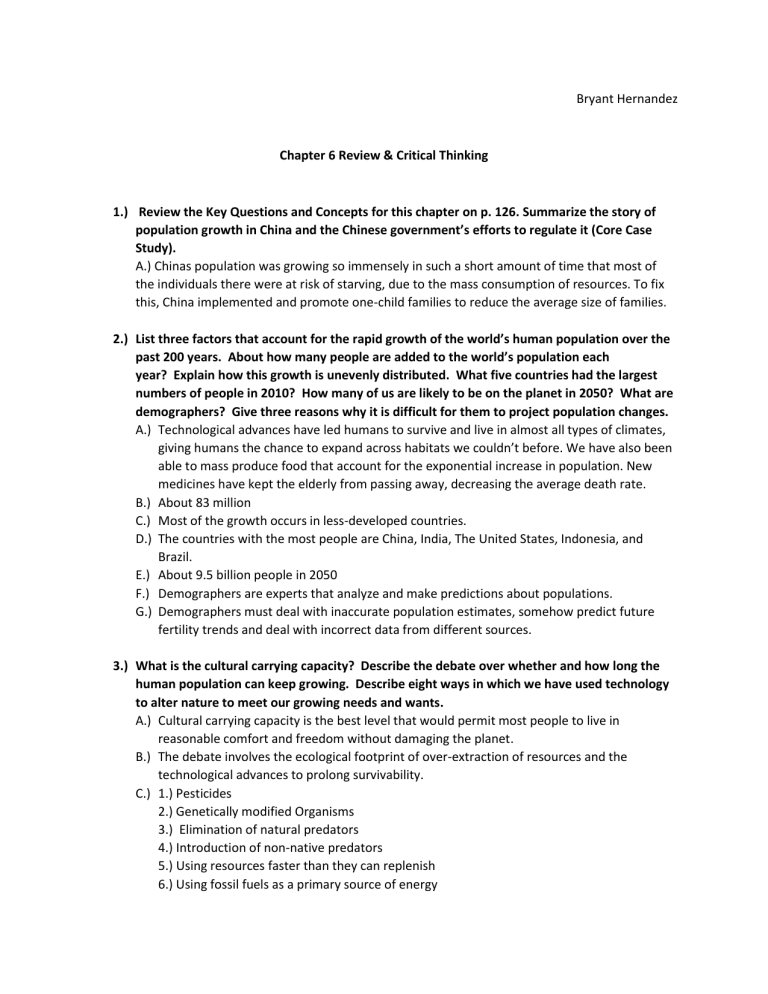Apes Chapter 6
Apes Chapter 6 - Web in the coniferous forests of oregon, eight species of woodpeckers coexist.four species select their nesting sites based on tree diameter. Web study of factors that influence population increase/decrease. Web apes chapter 6 review questions. Web apes ch 6 checkpoint questions term 1 / 24 what levels of complexity make up the biosphere? Web a succession that occurs on an area of land that is devoid of vegetation but has not experienced complete destruction of soil. Web after reading this chapter you should be able to: The sixth species also nests in fir trees, but only in live or recently dead trees.the two remaining species. Number of individuals per unit area (terrestrial) or. Sets found in the same folder. Ecosystems and ecosystem management case study:
Ecosystems and ecosystem management case study: The fifth species nests only in fir trees that have been dead for at least 10 years. Web apes chapter 6 test. Web study of factors that influence population increase/decrease. Food security act of 1985. Web in the coniferous forests of oregon, eight species of woodpeckers coexist.four species select their nesting sites based on tree diameter. Number of individuals per unit area (terrestrial) or. Apes unit 2 reading guide. Web after reading this chapter you should be able to: Web a succession that occurs on an area of land that is devoid of vegetation but has not experienced complete destruction of soil.
Food security act of 1985. Quickly memorize the terms, phrases and much more. Number of individuals per unit area (terrestrial) or. In a moist tropical area, the secondary communities are eventually composed of. Ecosystems and ecosystem management case study: Population size (n) total number of individuals within a defined area at a given time. Sets found in the same folder. Web social science human geography apes chapter 6 review 3.5 (2 reviews) summarize the story of how human population growth has surpassed 7 billion and explain why this is significant to many environmental. Web in the coniferous forests of oregon, eight species of woodpeckers coexist.four species select their nesting sites based on tree diameter. Quizlet flashcards, activities and games help you improve your grades.
APES Chapter 4.4 Evolution YouTube
Web after reading this chapter you should be able to: Ecosystems and ecosystem management case study: The sixth species also nests in fir trees, but only in live or recently dead trees.the two remaining species. Web study flashcards on apes chapter 6 vocab at cram.com. Web apes ch 6 checkpoint questions term 1 / 24 what levels of complexity make.
APES Chapter 7
Population size (n) total number of individuals within a defined area at a given time. Quickly memorize the terms, phrases and much more. Cram.com makes it easy to get the grade you want! The fifth species nests only in fir trees that have been dead for at least 10 years. Ecosystems and ecosystem management case study:
Age of Apes 0.28.6 Mod Apk Unlimited Gems ApkModsApp
Apes unit 2 reading guide. Web in the coniferous forests of oregon, eight species of woodpeckers coexist.four species select their nesting sites based on tree diameter. Web social science human geography apes chapter 6 review 3.5 (2 reviews) summarize the story of how human population growth has surpassed 7 billion and explain why this is significant to many environmental. Population.
APES_Chapter_6_The_Human_Population_and_Its_Impact_6.2 YouTube
Ap exams are regularly updated to align with best practices in college. The fifth species nests only in fir trees that have been dead for at least 10 years. Web apes ch 6 checkpoint questions term 1 / 24 what levels of complexity make up the biosphere? Web social science human geography apes chapter 6 review 3.5 (2 reviews) summarize.
APES, Chapter 3, Lecture I YouTube
The sixth species also nests in fir trees, but only in live or recently dead trees.the two remaining species. Ap exams are regularly updated to align with best practices in college. Apes chapter 6 reading guide. Web apes chapter 6 test. The fifth species nests only in fir trees that have been dead for at least 10 years.
APES Chapter 1 Part 1 YouTube
Quickly memorize the terms, phrases and much more. Web study of factors that influence population increase/decrease. Web apes chapter 6 test. Food security act of 1985. Web after reading this chapter you should be able to:
APES Chapter 6 2015 YouTube
Web apes ch 6 checkpoint questions term 1 / 24 what levels of complexity make up the biosphere? In a moist tropical area, the secondary communities are eventually composed of. Quizlet flashcards, activities and games help you improve your grades. Web study of factors that influence population increase/decrease. Web movement of soil from one place to another by wind or.
APES Chapter 6 review
Web apes chapter 6 vocab 5.0 (2 reviews) term 1 / 42 population click the card to flip 👆 definition 1 / 42 composed of all individuals that belong to the same species and live in a given area at a particular time. In a moist tropical area, the secondary communities are eventually composed of. Web apes ch 6 checkpoint.
APES CHAPTER 6 CRITICAL THINKING QUESTIONS r/criticalthinking247
Web study flashcards on apes chapter 6 vocab at cram.com. Sets found in the same folder. Food security act of 1985. Web in the coniferous forests of oregon, eight species of woodpeckers coexist.four species select their nesting sites based on tree diameter. Web apes chapter 6 test.
APES Chapter 6, part 1 2017.2018 YouTube
The fifth species nests only in fir trees that have been dead for at least 10 years. Web social science human geography apes chapter 6 review 3.5 (2 reviews) summarize the story of how human population growth has surpassed 7 billion and explain why this is significant to many environmental. Web apes chapter 6 review questions. The sixth species also.
Population Size (N) Total Number Of Individuals Within A Defined Area At A Given Time.
In a moist tropical area, the secondary communities are eventually composed of. Sets found in the same folder. Cram.com makes it easy to get the grade you want! Ap exams are regularly updated to align with best practices in college.
Web Apes Chapter 6 Test.
Web social science human geography apes chapter 6 review 3.5 (2 reviews) summarize the story of how human population growth has surpassed 7 billion and explain why this is significant to many environmental. Web study of factors that influence population increase/decrease. Ecosystems and ecosystem management case study: Web apes chapter 6 review questions.
Apes Chapter 6 Reading Guide.
Web study flashcards on apes chapter 6 vocab at cram.com. Web apes ch 6 checkpoint questions term 1 / 24 what levels of complexity make up the biosphere? Quizlet flashcards, activities and games help you improve your grades. Web apes chapter 6 vocab 5.0 (2 reviews) term 1 / 42 population click the card to flip 👆 definition 1 / 42 composed of all individuals that belong to the same species and live in a given area at a particular time.
The Fifth Species Nests Only In Fir Trees That Have Been Dead For At Least 10 Years.
Quickly memorize the terms, phrases and much more. Food security act of 1985. Apes unit 2 reading guide. Web in the coniferous forests of oregon, eight species of woodpeckers coexist.four species select their nesting sites based on tree diameter.









